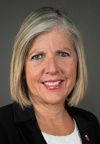SENATORS’ STATEMENTS — Safe Educational Institutions
November 23, 2023
Honourable senators, I am thankful for this last-minute opportunity to speak today, and for the chance to speak to something that I’ve been meaning to for a while.
I would like to take us back to June. Shortly after the Senate rose for the summer, at Hagey Hall on the campus of the University of Waterloo, a planned and targeted attack was carried out on students in a gender studies class.
The accused — a recent Waterloo graduate — stabbed and injured three people who were sent to the hospital with injuries. Fortunately, each one of them has physically recovered. This violated and shocked the university community, particularly the LGBTQ2+ community who were actively celebrating Pride Month.
Over the early days, this was confirmed to be a hate-motivated incident related to gender expression and gender identity. Approximately 40 students were inside the classroom during the stabbings of a 38-year-old associate professor from Kitchener and two students: a 20-year-old and a 19-year-old.
I had the opportunity to meet with students on the campus on picnic tables closely placed in a big circle at Hagey Hall two days after this incident. I listened as heartache, shock and anger were articulated — and articulated very well.
Universities Canada, an association which represents universities across the country, condemned this violence. In a statement, it said:
It is deeply concerning that this hate-motivated attack targeted gender expression and gender identity, and those seeking inclusion in our communities.
Professor Morrison, an associate professor of English at the University of Waterloo, stated:
It broke my heart and it terrified me. This is the building that I work in. I teach in that classroom. I teach students similar materials. All of us are a lot less safe because of this.
As the days and weeks have passed, this incident has sparked much debate, thought and action. Post-secondary institutions must ensure they remain arenas of free debate, while protecting marginalized groups at the centre of polarizing discussions and issues.
We all know that the freedom to explore differences and to challenge conventional wisdom is at the heart of what universities and colleges are all about, and they should be. However, this is one of the things that we are also very clear about in Canada: Free expression does not include the right to express yourself or incite violence.
While still very rare, this terrible incident at Waterloo has demonstrated that new ideas, open discussion and debate can breed violence, especially when mixed with the recent political discourse on the rights of our LGBTQ2+ youth in our schools. Universities and colleges are responding with recognition that those LGBTQ2+ have come under increasing assault across Canada in a variety of settings.
Colleagues, I urge all of us to reflect on this incident. The opinions we express can often have unintended, real-world consequences for individual Canadians. Like this chamber, we must ensure that all educational institutions are safe, welcoming, inclusive places for learning.

